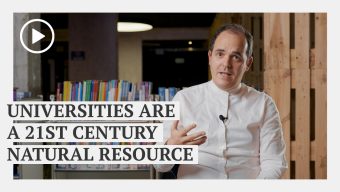It is well known that the ability of a structure to last over time depends on its foundation and how well it can resist and adapt to adversities and novelties, to expansion and contraction, and, yes, to natural disasters and pandemics. In fact, this principle can be applied to many components of society, from buildings and businesses to personal relationships. Foundations are built on the strength of communities, communications, civility, institutions, social values, economics, politics, and especially education.
For it is through education that individuals acquire the specific skills and knowledge that supports their personal career path and allows them to filter information, develop critical thinking, and add to the betterment of their community and society at large. The education of individuals is a key foundation for economic growth. A prime example of this is how education can positively impact one of the most human economic sectors: tourism.
A variety of skills are needed to be part of a competitive tourism sector, including customer service, marketing, storytelling, innovation, and entrepreneurship, and the ability to identify and harness the power of new technologies such as big data and artificial intelligence. Tourism is considered one of the leading employers in the world; by 2019 the sector had generated 7% of global trade and employed one in 10 people worldwide, especially women and young people. And while the pandemic has put more than 100 million direct tourism jobs at risk, past crises – including the global economic crisis, volcanic eruptions, and the Swine Flu – have shown it to be a dynamically resilient sector.
High school students should have access to tourism-related electives that allow them to create their own businesses.
However, despite the prominence of tourism within the world economy, 50% of its professionals have only acquired secondary or soft skills. This scenario is not a major issue in the medium term. However, stagnated academic formation can perpetuate an informal labor market which is, while a tempting option due to the high percentage of uneducated workers in tourism, simply unsustainable in the long term. Additionally, the current Covid-19 crisis has highlighted the difficulties and shortages experienced by those who live thanks to this informal employment model. And furthermore, 50% of the youth in the tourism sector aspire to be entrepreneurs but most – particularly in emerging tourism destinations such as Brazil and Saudi Arabia – are unable to achieve this goal for lack of opportunity, tools, and resources, and access to academic training.
The solution to tourism’s informal labor market is a lifelong learning methodology in which online education helps scale the way people are educated. In order to create added value jobs and empower young leaders, we must develop an educational model that begins early, with helping kids understand the importance of tourism on society and embedding classes within the curriculum that teach skills related to tourism and hospitality. In addition, in those emerging countries where tourism is part of public policy strategy to become a relevant economic sector, high school students should have access to tourism-related electives that allow them to create their own businesses, and learn about how the industry is connected to or relies upon transport, gastronomy, arts, humanities, commerce, and sustainability.
In most cases, tourism is a complement to education, in contrast to other fields of knowledge that we learn about as early as primary school, such as social sciences, mathematics, languages, economics, arts, etc. Rarely do we encounter elementary schools with tourism-focused vocational curricula, even in those regions with tourism-based economies. There is no reason to wait until students are aged 18 and graduating to start training them in tourism. Furthermore, imagine what would happen if tourism education was digitized accessible to those who have little opportunity?
Colombia is a success case. The country’s national program “Colegios Amigos del Turismo” includes tourism in the curriculum of hundreds of public schools in an effort to train Colombian talent in the country’s most important nontraditional economic sector.
The goal of creating a tourism education mindset is key if tourism is to truly play a significant role in driving employment and addressing modern-day needs, let alone lead the discussion of what kind of opportunity and future we want for youth around the world. One way to achieve this is through innovation and sustainable investment.
Israel may not be among the top three tourism destinations, but the country has channeled its strength in entrepreneurship and digital transformation to become one of the world’s top three tourism innovation ecosystems. In this way, new ventures and technology focused on tourism have added valuable jobs to the sector. The importance that Israel lends to training in innovation is embedded in the country’s education mindset – particularly through the compulsory military service – and, yes, this training has a positive effect on the tourism sector. But, what if there were also an education model specifically geared toward tourism? We would be providing future tourism workers with hard skills and primary skills that would render the sector better trained, more competitive, and focused on sustainability, inclusivity, profit, and prosperity.
Another educational framework worth investigating can be found in the Kingdom of Saudi Arabia, which was closed to tourism until just a few years ago. The government has since created a public policy that prioritizes tourism in an effort to diversify the economy and provide new employment opportunities for citizens. Thanks to the policy, the country has the potential to become a strong touristic hotspot.
If there is no training in tourism, the circle of poverty will continue and young people will be forced to opt for informal, poorly paid, and occasional employment.
Saudi Arabia currently has the most ambitious tourism education strategy, with the government investing in the first global tourism academy in partnership with the United Nations World Tourism Organization. The aim of the partnership is to have national and international talent in Saudi Arabia train with renowned vocational and managerial institutions and practice their skills in the biggest investment tourism project in the world: Qiddiya, a USD10 billion tourist project that includes five-star hotels, amusement parks, cultural attractions, lifestyle, and wellbeing.
It is clear that a strong and educated tourism sector can become drive economic relevance and impact, and sustainable development. Moreover, it has the potential to serve as the livelihood for millions of families seeking to lift themselves out of poverty. But in order for this to happen, a youth-led sustainable tourism model must be in place. This requires access to quality tourism education because if there is no training in tourism, the circle of poverty will continue and young people will be forced to opt for informal, poorly paid, and occasional employment.
It is important to also acknowledge that tourism education is the gateway to sustainability, specifically sustainability as a business. The creation of sustainable tourism businesses is only possible once the sector’s professionals acquire hard-skills, and can take advantage of governmental tax incentives that reduce environmental impact, lower pollution, foster green infrastructure, and curb environmentally damaging behaviors.
For example, Costa Rica is focused on preserving biodiversity, offering economic incentives to investors who bring in responsible companies that work with local communities and empower those communities through education, thereby making the tourism business more impactful, resilient, and inclusive.
For the first time in history, due to Covid-19, international borders were closed. With the lockdown, tourism came to a screeching halt and so did a part of our education. As we now begin to travel again, we have a unique opportunity to rethink and reset the tourism model and empower education as a way to increase training, reduce labor informality, reduce poverty, and enable countries to enter the global market via tourism and hospitality. The priority must be to bring about a more innovative, inclusive, and sustainable tourism sector in which youth are the protagonists.
© IE Insights.






